Eczema doesn’t mean normal
Eczema is one of the most frequently seen skin issues in babies and toddlers. And if you're reading this, there’s a good chance you’ve been told something like:
“It’s normal.”
“They’ll grow out of it.”
“Just use this cream.”
But just because eczema is common, doesn’t mean it should be considered normal.
And managing it with creams alone? That rarely addresses the real cause.
What’s going on beneath the skin?
Eczema is rarely just a skin-deep issue. It’s often a reflection of what’s happening internally — particularly in the gut and immune system.
In fact, what we see on the skin is often one of the body’s ways of telling us that something is out of balance. The microbiome and immune system are still developing in infancy and early childhood, which makes them more vulnerable to overreacting to food and environmental triggers.
This overreaction is what can show up as inflammation in the skin — aka eczema.
The gut-skin-immune connection
Around 70–80% of the immune system is housed in the gut. So when a baby’s microbiome is disrupted or underdeveloped, their immune system may go into high alert — reacting to things it shouldn’t.
This can be triggered by things like:
Antibiotic exposure (including from birth)
C-section deliveries
Lack of microbial diversity
Early or poorly supported introduction of solids
Low intake of gut-supportive nutrients
All of these can contribute to what we call immune dysregulation — and that’s when common issues like eczema can begin to surface.
Food isn’t always the problem — but the gut’s readiness matters
For many parents, eczema seems to flare when solids are introduced. It can feel like the food is the issue — but often, it’s not the food itself, it’s the state of the gut when that food is introduced.
Some babies benefit from a slower, more considered introduction of allergens. Others may need extra support to build up microbial diversity and immune resilience first.
That’s where I come in. This is what I specialise in — creating a gentle, supportive plan for introducing allergenic foods in a way that works for your baby’s unique system.
Where to start
There’s no one-size-fits-all solution. But there is support available — and you don’t have to navigate this alone.
1:1 nutrition consults
In our consult, we’ll look at your child’s history, symptoms, diet, and gut health in detail. Together, we create a plan that helps reduce flare-ups, improve tolerance, and support the immune system at its roots.
Book a consult here:
Allergy & Eczema Essentials eBook
Not ready for a consult just yet? This digital guide is a great place to begin.
It includes:
How to gently introduce allergenic foods with less stress
How to support the gut and immune system through food
What’s a true allergic reaction vs a sensitivity
If your baby has eczema, it’s not your fault — and you’re not imagining things if it feels like something deeper is going on.
There is a way forward that doesn’t involve constant flare-ups, fear of food, or relying on steroid creams long-term. Eczema may be common, but that doesn’t mean it has to be your new normal.
Let’s help your little one’s body find calm again — from the inside out.








